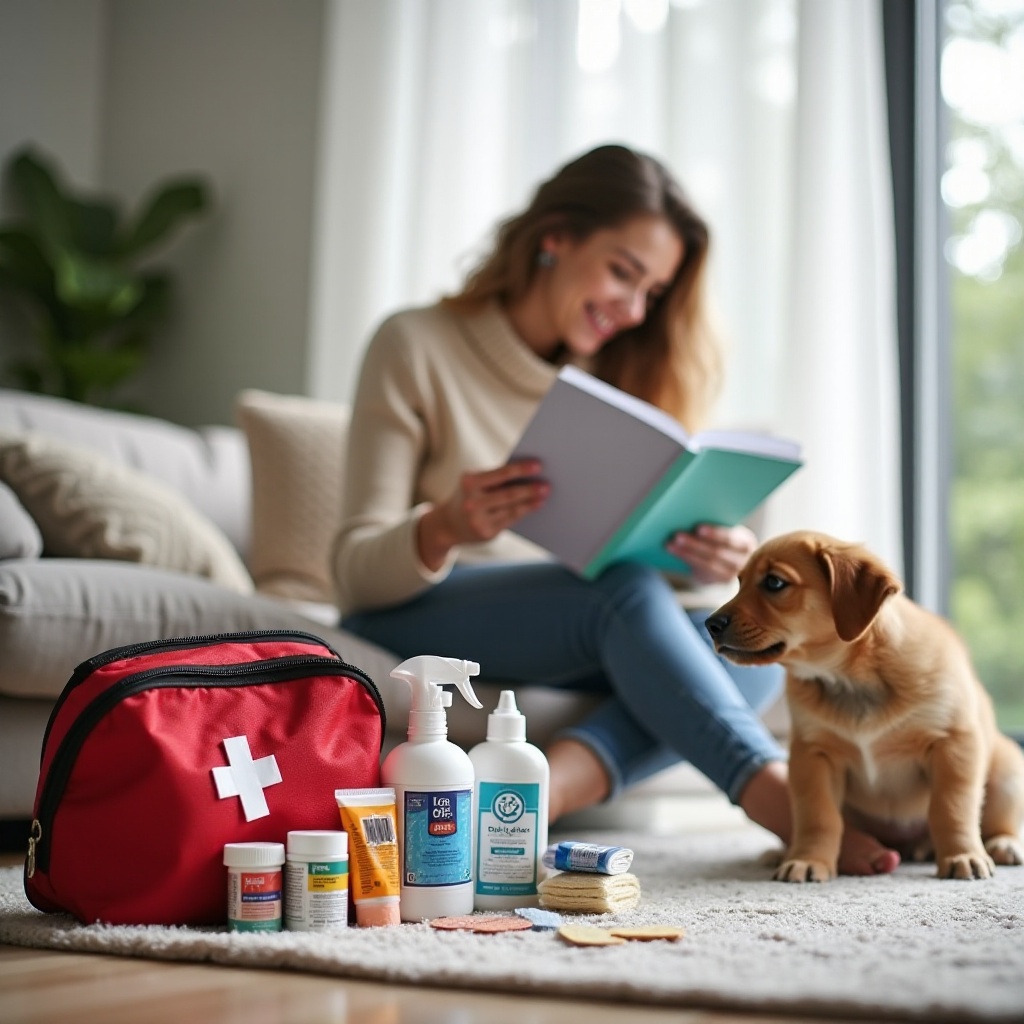Introduction
When your puppy throws up, it’s natural to feel concerned and unsure of what to do next. Puppy vomiting can be caused by a variety of factors ranging from benign to serious health concerns. Understanding the common causes, knowing the immediate actions to take, and having the right supplies can help you manage the situation effectively. This comprehensive guide will provide you with essential information to ensure your puppy’s well-being and give you peace of mind.

Common Causes of Puppy Vomiting
Puppy vomiting can be triggered by different causes. One common reason is dietary indiscretion, where your puppy eats something it shouldn’t, such as table scraps, garbage, or toxic plants. Puppies are naturally curious and may explore the world by chewing and swallowing various items. Another frequent cause is gastrointestinal infections, which can lead to irritation and upset in their stomach.
Ingesting toxins is another serious cause. Household products, certain human foods like chocolate, and plants can be toxic to puppies. Additionally, abrupt changes in diet or food allergies can result in vomiting. Motion sickness during car rides is another possible cause, as puppies’ inner ears are not fully developed. Parasites such as worms can also irritate a puppy’s stomach.
Transitioning to understanding how to act swiftly when your puppy throws up is crucial for their recovery.
Immediate Actions to Take When Your Puppy Throws Up
When your puppy throws up, take these immediate actions to address the situation. First, monitor the vomit for any signs of foreign objects, blood, or unusual color, as these could indicate a more serious issue. Clear any vomit to prevent re-ingestion, and keep your puppy in a safe and comfortable area.
Next, withhold food and water for a short period, usually about 12 hours, to allow your puppy’s stomach to settle. Gradually reintroduce small amounts of water after a couple of hours, observing if there are any signs of continued vomiting. If the vomiting persists, it is important to seek veterinary care immediately.
Being prepared with the right health supplies can make managing such situations much simpler.
Essential Dog Health Supplies for Managing Vomiting
Having the right dog health supplies on hand can make managing your puppy’s vomiting much easier. Here’s a list of essential items:
Electrolyte Solutions
Dehydration is a significant concern when a puppy vomits. Electrolyte solutions are crucial as they help replenish lost fluids and minerals. Look for products specifically designed for dogs, which can often be found at pet stores or through your vet. Administering small amounts of electrolyte solution can ensure that your puppy stays hydrated and recovers more quickly.
Bland Diet Options
After the initial fasting period, introducing a bland diet can help your puppy’s stomach settle. This typically includes easily digestible foods such as boiled chicken and rice. It’s important to feed small, frequent meals rather than one large meal. Gradually transition back to your puppy’s regular diet over a few days, ensuring that their digestive system adjusts without causing further upset.
Puppy-Safe Cleaners for Vomit
Keeping your environment clean is essential for both hygiene and preventing re-ingestion of vomit. Use pet-safe cleaners specifically formulated to neutralize odors and remove stains without using harsh chemicals that could harm your puppy. Enzyme-based cleaners are particularly effective, breaking down organic materials and ensuring thorough cleaning.
Sometimes, despite our best efforts, professional help is required.
When to Consult a Veterinarian
Knowing when to consult a veterinarian can be crucial for your puppy’s health. Seek veterinary care if your puppy experiences persistent vomiting lasting more than 12 hours, or if vomiting is accompanied by diarrhea, lethargy, or signs of pain. Also, if the vomit contains blood, looks dark or black (indicating potential internal bleeding), or if your puppy ingested a known toxin or foreign object, immediate veterinary attention is necessary. Your vet can conduct a thorough examination and provide appropriate treatment based on the underlying cause.
Now that we’ve covered immediate actions and supplies, let’s discuss how to prevent such incidents in the future.

Preventing Future Incidents
Prevention is always better than cure. To prevent future vomiting incidents, ensure your puppy has a balanced, consistent diet and avoid giving them table scraps or foods that could upset their stomach. Puppy-proof your home to limit access to potentially harmful substances and objects. Regularly clean and maintain their feeding area, water bowls, and toys to prevent bacterial contamination.
Additionally, regular veterinary check-ups are essential. Your vet can provide guidance on proper nutrition and health maintenance, ensuring that any potential issues are caught early and managed effectively. Keeping your puppy stress-free and gradually exposing them to car rides can also reduce the risk of motion sickness-induced vomiting.

Conclusion
Taking prompt and appropriate action when your puppy throws up can make a significant difference in their recovery. By understanding the common causes of vomiting, knowing the immediate steps to take, and having essential health supplies on hand, you can ensure your puppy’s health and well-being. When in doubt, always consult your veterinarian to address any lingering concerns or serious symptoms. With a little preparation and care, you can help prevent future incidents and keep your furry friend happy and healthy.
Frequently Asked Questions
What should I do if my puppy vomits multiple times in a day?
If your puppy vomits multiple times in a day, withhold food and consult your veterinarian immediately, as this could indicate a serious health issue.
Are there any home remedies for a vomiting puppy?
Home remedies include offering small amounts of electrolyte solution and feeding a bland diet of boiled chicken and rice to help settle your puppy’s stomach.
How can I make sure my puppy stays hydrated after vomiting?
Ensure your puppy stays hydrated by offering small amounts of water frequently and administering an electrolyte solution specifically designed for pets.
